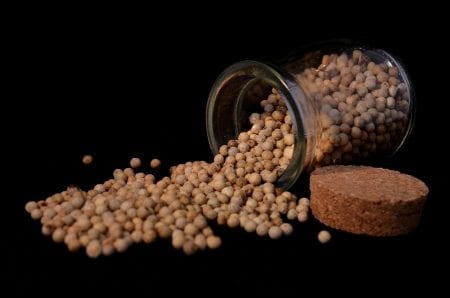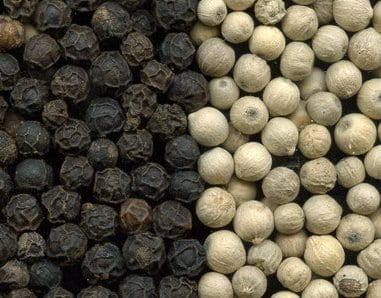 Black pepper – the name of a plant, the same name whose fruits are one of the most common spices available in every hostess. It is used in the form of peas, and in a hammer, at the preparation of all kinds of dishes, billets, and even alcoholic cocktails.
Black pepper – the name of a plant, the same name whose fruits are one of the most common spices available in every hostess. It is used in the form of peas, and in a hammer, at the preparation of all kinds of dishes, billets, and even alcoholic cocktails.
Varieties of black pepper
Often, in stores you can see condiments called “Mix of peppers” or “4 peppers”, which consist of peas of different colors. In fact, all these are the fruits of one plant, collected at different stages of maturation and treated differently.
Black wrinkled peas, often ground into fine powder, is an immature fruit of the plant, called black pepper. Fruits are removed from the tree green, cooked with boiling water, and then dried. In the process of drying, the shell of the seeds blacken and wrinkles, resulting in the same peas that we can buy in any store.
Sometimes green nuts are treated with sulfur dioxide or dried with special methods that allow you to keep the color of the fruit. And then the green pepper is on sale. Similarly, peanuts of pink color are obtained. Fruits are harvested immature and subjected to different types of processing, of course, for the rapid gaining of economic benefits.
Although not all fruits are harvested from trees for a quick profit. Some of them leave to ripen, resulting in white pepper (mature fruits have a light gray color). This product has a subtle taste and aroma, and is used in the same way as black pepper, which is well known to us.
The benefits of black pepper
Black pepper is rich in proteins, carbohydrates, vitamins and minerals, it contains the essential oil that causes its smell, and the alkaloid piperin responsible for the burning taste. Substances contained in the fruits of black pepper have a vasoconstriction effect, they contribute to the dilution of blood, the purification of blood vessels from cholesterol, strengthen immunity. Regular use of this seasoning is a small contribution to the body’s health for many years.
Of course, we all well understand that when eating 1-2 g of ground or a few peas of pepper whole we will not feel the effect on the body. But the local influence of this spice can be quite tangible and useful.
This seasoning has a beneficial effect on the digestive system. Burning taste and spicy aroma contribute to the improvement of appetite, stimulate the production of hydrochloric acid and digestive enzymes. Piperine has anti-inflammatory, antimicrobial, worm-like and analgesic action. There is evidence that it repeatedly increases the bio availability of nutrients and medicines.
That is why from the Soviet times the list is on every table in practically all catering establishments.
In Ayurveda (the direction of Indian medicine) of black pepper is given a very important role, it is quite possible to explain also that India’s home is considered to be this plant. Fruits of this spice are used for the treatment of not only digestive organs, but also respiratory and genitourinary systems, hemorrhoids and many other diseases.

It’s a pity of black pepper
The pity of this product is due to abuse of it. You can not use black pepper in the exacerbation of diseases of the gastrointestinal tract, genitourinary system, hemorrhoids and other chronic diseases. However, in the remission period, adding this spice to food is useful.
Picture Credit: congerdesign
